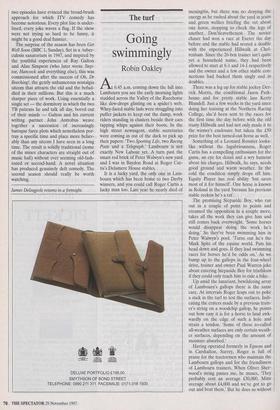Television
What's so funny?
Marcus Berkmann
Situation comedy: the easiest critical target of them all. What makes you laugh doesn't make me laugh, and what makes the head of light entertainment laugh makes no one laugh anywhere else in the world. All new examples of the form are ritually disembowelled by critics bored of handing out gushingly favourable reviews to mediocre factual series on BBC 2. The fact that sitcom is just about the trickiest television genre to get right is conveniently disregarded until someone does get it right and everyone wants to know how they did it. The problem is that no one has a clue. You can point to wonderful scripts and inspired casting, sensitive direction and creative production, but usually only with hindsight, for most such qualities rarely become evident before a show's second or even third season. In their early days all but the most rightly starred sitcoms struggle for tone and rhythm, while bending over back- wards to make us laugh. The further you bend, of course, the more likely you are to fall. Accordingly each autumn's schedules resound to the crash of overbalancing sit- coms. This year's crop has been more deaf- ening than most.
Spark (BBC 1, Monday) is the latest show from Roy Clarke, who has been writ- ing Last of the Summer Wine for 25 years, apparently voluntarily. James Fleet plays a nerdy 40-ish computer programmer with a vaguely northern accent — admit it, you wished you'd watched it already — who has been looking after his elderly mother for years and now, after her death, ventures into the world to seek a wife. Old idea? More grizzled even than Compo, Clegg and Foggy Dewhurst, and rather less steady on its pins. After three episodes poor Fleet has already stumbled into several allegedly hilarious scrapes, generally witnessed by his awful stereotypical yuppie brother (mobile phone, Bee Gee beard). Most minor char- acters are northern grotesques who ramble on incessantly to fill time before the next scrape. It's like 50,000 other shows you have seen but somehow ghastly in an entirely new way. No doubt it'll be a gigan- tic hit.
ITV, meanwhile, has Blind Men (Friday), a tale of warring salesmen presumably inspired by the film Tin Men. Written by Chris England and Nick Hancock, this is a nice idea that isn't even close to finding its feet. Jeremy Swift and Jesse Birdsall sell curtains to mugs in the suburbs, and live next door to each other, and hate each other, a combination of factors which should be able to generate a steady supply of scrapes. Indeed, there is much potential here for the sort of bleak, downbeat sitcom at which British television has traditionally excelled — or at least there would be if the show were on the BBC. As it is, the first two episodes have evinced the broad-brush approach for which ITV comedy has become notorious. Every plot line is under- lined, every joke waves a flag. If the show were not trying so hard to be funny, it might be a good deal funnier.
The surprise of the season has been Get Well Soon (BBC 1, Sunday). Set in a tuber- culosis sanatorium in 1947, and inspired by the youthful experiences of Ray Galton and Alan Simpson (who later wrote Step- toe, Hancock and everything else), this was commissioned after the success of Oh, Dr Beeching!, the gently unhumorous nostalgia sitcom that attracts the old and the befud- dled in their millions. But this is a much sharper piece of work. Using essentially a single set — the dormitory in which the two TB patients lie and talk all day, bored out of their minds — Galton and his current writing partner John Antrobus weave together a succession of increasingly baroque farce plots which nonetheless por- tray a specific time and place more believ- ably than any sitcom I have seen in a long time. The result is solidly traditional (some of the minor characters are straight out of music hall) without ever seeming old-fash- ioned or second-hand. A novel situation has produced genuinely deft comedy. The second season should really be worth watching.



















































































 Previous page
Previous page